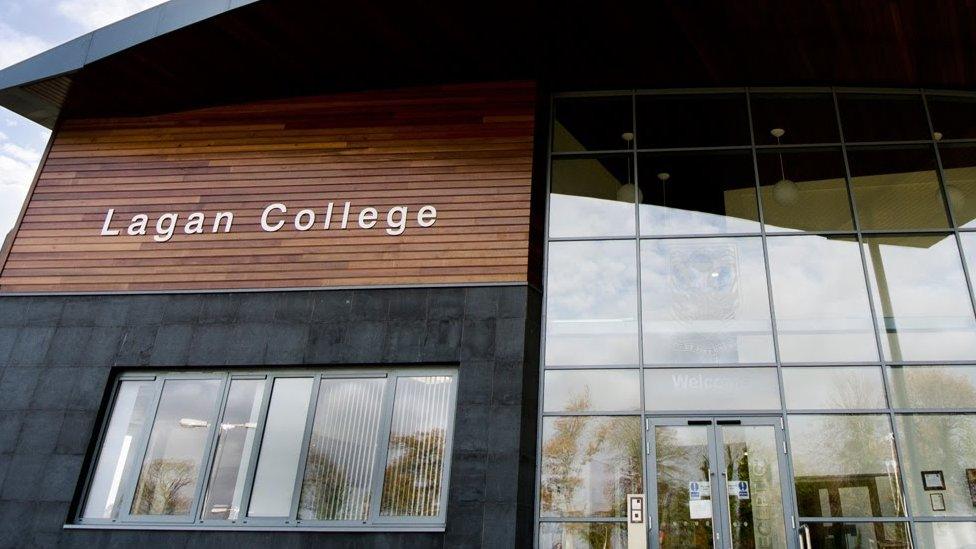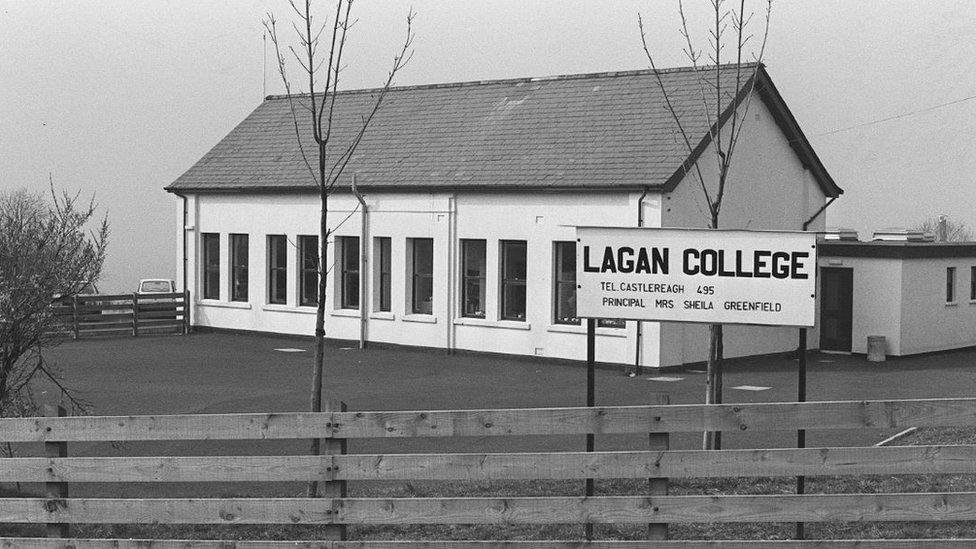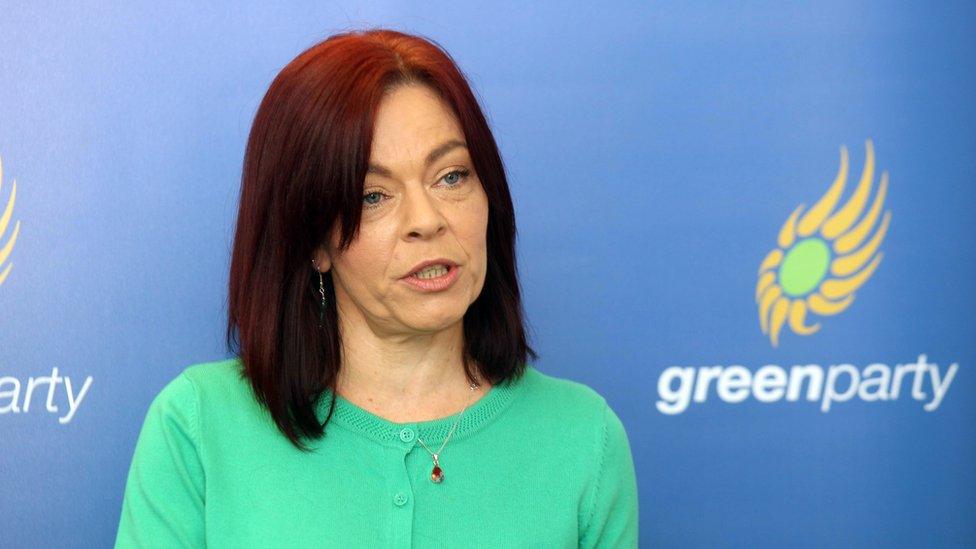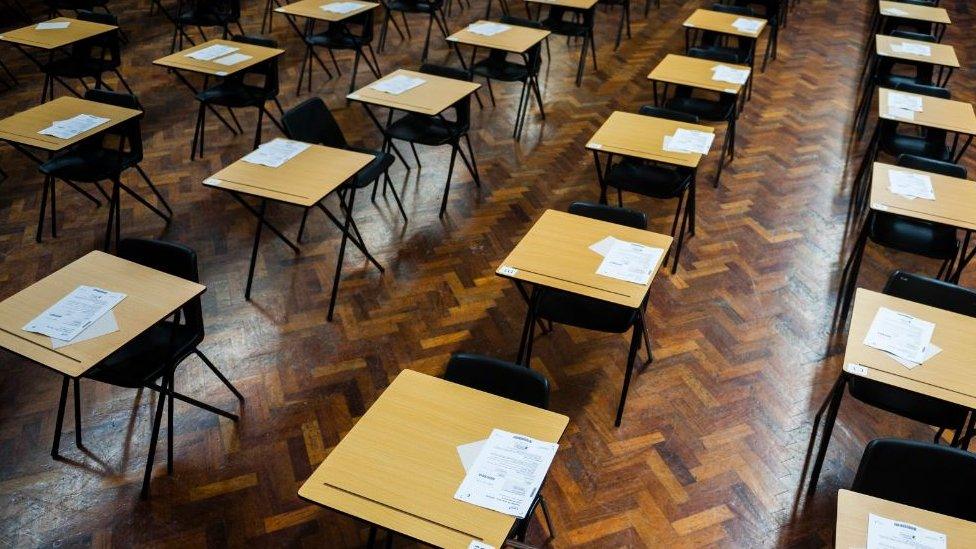Lagan College: Northern Ireland's oldest integrated school marks 40 years
- Published
A school picnic marked the opening of Lagan College in September 1981
Northern Ireland's oldest integrated school will hold a ceremony on Monday to celebrate 40 years since it opened.
Lagan College in south Belfast first opened with 28 pupils in a scout centre in September 1981.
The school now has more than 1,400 pupils on an extensive site in the Castlereagh area of the city.
Currently, about a third of its pupils are Protestant, just under 40% are Catholic and about 30% are from other backgrounds.
It is one of almost 70 integrated schools in Northern Ireland - which mix children from Protestant, Catholic and other backgrounds.
Four new integrated schools, including the first Catholic school to transform to integrated status, opened at the start of the 2021/22 school term.
Armed guard on first day
However, only about 7% of children in Northern Ireland go to formally integrated schools.
Lagan College was originally set up by parents from the All Children Together Movement in 1981.

Lagan College is one of almost 70 integrated schools in Northern Ireland
The principal was Sheila Greenfield and the school had one full-time and five part-time teachers.
Newspapers reports from the time said police provided an "armed guard" as pupils arrived for their first day.
BBC News interviewed the first pupils at the new school in 1981, including one pupil who spoke about why he felt it was important for Northern Ireland.
"It's very good how Catholics and Protestants and the other religions can get to meet and find out what the religions really have in common," he said.
"People might say 'he's a Jew or he's a Catholic or don't talk to him, he's Protestant,' things like that.
"And I think it's right that Catholics and Protestants should be able to get on better together."

The school is now one of Northern Ireland's most over-subscribed post-primary schools
He added: "That's what the trouble is in Northern Ireland and this school, I think, if there were more of them the trouble wouldn't be as bad.
"It's a solution to maybe solve the Troubles in Northern Ireland."
'Day of celebration'
Lagan College later moved into to a disused primary school and was also housed in the Ulster Folk and Transport Museum at Cultra for a period in the early 1980s.
It became funded by the Department for Education (DE) in 1984 and moved on to its current site in 1987.
It is regularly one of the most over-subscribed post-primary schools in Northern Ireland, with many more pupils seeking to enter it every year than it has places for.
The school's current principal, Amanda McNamee, said it would have been a "leap of faith" for staff and parents when the school first opened.

Green Party leader Clare Bailey was one of the first pupils
"It would have been a momentous challenge, probably set against the political backdrop and the social difficulties that Northern Ireland was having," she said.
Ms McNamee said there would be cake at the school and balloons to mark a "day of celebration".
Green Party leader Clare Bailey, one of the first pupils, recalled protests at the school and the world's media attending Lagan College's first day.
She told BBC News NI's Good Morning Ulster that pupils were split into two classes of 14 and faced challenges due to the temporary building they had to use.
"There was no school, there was no canteen, no school dinners, there was no science labs or home economics labs, it was just one room and we had to set up the room every day," she said.
Many aspects of the religious separation of schools date back to the formation of the Northern Irish state in 1921.
That has led to criticism that Northern Ireland's education system is "divided, splintered and overly expensive".
Some schools which are not formally integrated also have pupils from a mix of backgrounds.

The school moved to its current site in 1987
Figures in a recent development proposal for Mid Down Integrated College, a new post-primary school in County Down, illustrate this.
Down High School in Downpatrick has 575 Protestant pupils, 189 Catholic pupils and 172 from other backgrounds, for example.
However, most schools in Northern Ireland have pupils from predominantly Catholic or Protestant backgrounds.
Some schools, however, take part in shared education where pupils and staff from different schools meet up for classes and projects.
There is a statutory duty on DE, dating from 1989, "to encourage and facilitate the development of integrated education, that is to say the education together at school of Protestant and Catholic pupils."
The New Decade New Approach (NDNA) deal, agreed in January 2020, said the education system - with a range of sectors and school types - was "not sustainable".
It also promised a "fundamental review" of Northern Ireland's education system but that has not yet begun.
Related topics
- Published31 May 2020
